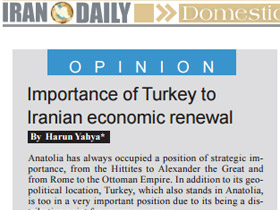
The two essential elements that countries need for development are water and energy. Wars, civil strife, divisions and conflicts in many regions generally occur over water and energy.
Turkey is a country that stands at the center of a region where water and energy wars have taken place. Some 70 percent of the world’s natural gas reserves are in close proximity to the country; the situation is similar when it comes to petrol. When we add the Istanbul and Dardanelles Straits to Turkey’s proximity to the Strait of Hormuz, the Suez Canal and the Mandeb Strait, we can clearly see the important position which it occupies.
As energy wars are going on all round Turkey, a new player has now entered the stage; Iran, which had been largely excluded from the world energy sector. Now that Iran is again a player in the game with the recent agreement signed between Tehran and the P5+1 (The five permanent members of the UN Security Council, the USA, Russia, China, France and United Kingdom plus Germany) there is no doubt that many balances will change.
Like Turkey, Iran also occupies a very special geographic position. The country stands right in the middle of the Caspian and Persian Gulf region energy fields and it is a critical staging post in the transportation of those resources to China. In addition, since it shares a border with Turkey, it can easily access the European and world energy markets by using Turkey's pipelines.
Iran is primarily known for its oil reserves. Throughout three decades of embargo, Iran was China’s number one oil supplier. Today, however, it is in the whole world’s sights because of its natural gas reserves.
Iran has natural gas reserves of 34 trillion m3, representing 18.2 percent of the world’s total reserves, making it one of the world’s most important countries. At the same time it is the world’s fourth largest natural gas producer.
Iran is currently capable of producing 5 percent of the world’s natural gas. This is a very low level when compared to its potential. When the South Pars Gas Field goes into full operation in 2020 as planned, Iran is expected to become a leading exporter of natural gas.
There are various reasons why Iran is currently not a leading natural gas exporter despite possessing such wealthy reserves. The main reason is sanctions: Enforced since 1979, sanctions have prevented considerable growth in Iranian natural gas exports. Due to those sanctions, Iran has been unable to enjoy technology transfers in the energy field and has had to use its own rather limited technology and means to access its energy reserves. The sanctions have also blocked Iranian sales of the gas it has produced.
Some of the current laws in Iran have also hindered the more efficient use of its energy resources. The Iranian Parliament is planning to bring in amendments to the existing laws that will go into operation at the end of 2015.
Among the countries to which Iran plans to sell its natural gas once sanctions are lifted are India, Pakistan, Afghanistan, China, the UAE, Kuwait, Iraq and Syria. It also intends to reach Japan and South Korea with the liquefied natural gas terminals it's planning on building; these terminals will have a capacity of 70 million tons once they go into operation.
The countries of the EU, which currently obtain much of the natural gas they use from Russia, are now looking for new suppliers. In that respect, Iranian natural gas is critically important for the EU. The fact that Iranian natural gas can reach Europe through pipelines across Turkey makes it highly attractive in terms of both investment costs and time-saving.
The fastest and most economical route for Iranian natural gas to reach Europe is through already existing transfer lines in Turkey. What particularly needs to be done now is to increase the capacity of the Tabriz-Ankara pipeline. That will allow Iranian natural gas to reach Europe quite easily through TANAP and TAP in Turkey.
Although Turkey is dependent on external sources when it comes to energy, its proximity to energy resources, and its role in bringing these to the world, means it occupies a strategic position in the world of energy. With its established refineries, the Ceyhan Terminal, the oil pipeline from Northern Iraq, the Baku-Ceyhan oil pipeline, the Southern Caucasus natural gas pipeline, the Tabriz-Ankara natural gas pipeline, TANAP, TAP, Blue Stream, South Stream and many other projected pipelines make Turkey an intersection point for energy producers and buyers. If Turkey and Iran can collaborate successfully, Turkey can carry Iranian oil and natural gas to the world. There is no doubt that such a collaboration would be an auspicious initiative that will hopefully bring increased prosperity for the Iranian people, who have for decades suffered from the sanctions imposed on them.
Adnan Oktar's piece on Iran Daily & Islamic Republic News Agency:


